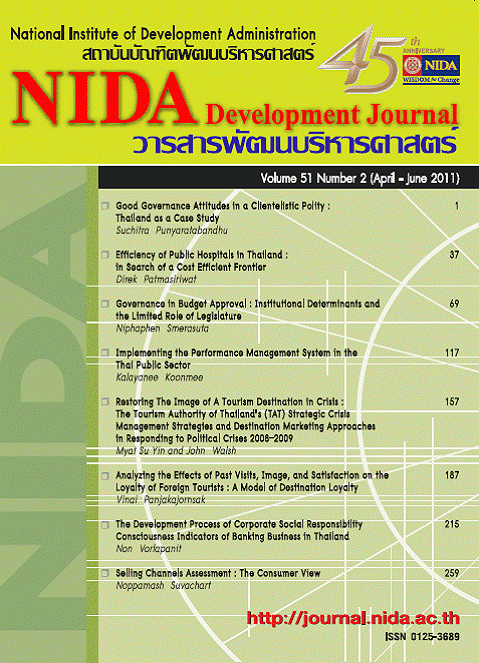The Development Process of Corporate Social Responsibility Consciousness Indicators of Banking Business in Thailand กระบวนการพัฒนาตัวชี้วัดจิตสำนึกด้านความรับผิดชอบต่อสังคมของธุรกิจธนาคารในประเทศไทย
Keywords:
Corporate Social Responsibility, Consciousness Indicators, Banking BusinessAbstract
This research is intended to develop the CSR consciousness indicators of the banking business in Thailand by using multi-stakeholder approaches. The process of indicator development is composed of eight phases originating from constructing theoretical indicators, defining CSR and CSR consciousness, specifying compositions, criteria, and indicators, developing assumptions and definitions, developing compositions, criteria, and indicators, verifying a practical ability, verifying theoretical correspondence, weighting compositions and indicators. Questionnaires and in-depth interviews were the tools used for the data collection, while qualitative methods (i.e. content analysis, descriptive analysis, component analysis, and typological analysis) were utilized to analyze and interpret the data. The adding method was used to weigh the indicators.
CSR consciousness indicators consist of three components: consciousness of driving CSR in all banking structure scoring at 34.62 percent, consciousness of stakeholders’ response scoring at 33.65 percent, and consciousness of disclosure scoring at 31.73 percent. Consciousness of driving CSR in all banking processes was divided into two components—consciousness of driving formal structure and consciousness of driving informal structure. Consciousness of stakeholders’ response is composed of eight components, from consciousness of shareholders, employees, customers, partners, community, society, and environment, to consciousness of CSR participation. Finally, consciousness of disclosure consists of two components, fundamental report disclosure and strategy and indicator report disclosure.
The study reveals that CSR consciousness indicators could lead to a comprehensive and integrative understanding of the CSR of the banking business. Banking business should focus on a new aspect of CSR and apply these indicators covering CSR indicators into organizations side by side with intensifying the multi-stakeholder participation process in order to develop more appropriate CSR consciousness indicators for each bank.
การวิจัยครั้งนี้มีวัตถุประสงค์เพื่อพัฒนาตัวชี้วัดจิตสำนึกด้านความรับผิดชอบต่อสังคมของธุรกิจธนาคารในประเทศไทยโดยใช้การมีส่วนร่วมของผู้มีส่วนได้เสียจากทุกภาคส่วน โดยกระบวนการพัฒนาตัวชี้วัดเริ่มจากการสร้างตัวชี้วัดจากทฤษฎี การนิยามความรับผิดชอบต่อสังคมและจิตสำนึกด้านความรับผิดชอบต่อสังคมของธุรกิจธนาคาร การกำหนดองค์ประกอบ เกณฑ์การให้คะแนน และตัวชี้วัด การพัฒนาฐานคิดและนิยาม การพัฒนาองค์ประกอบ เกณฑ์การให้คะแนน และตัวชี้วัด การตรวจสอบความเป็นไปได้ในการนำไปใช้ การตรวจสอบความสอดคล้องกับทฤษฎี และการถ่วงน้ำหนักตัวชี้วัด สำหรับการเก็บข้อมูลจะใช้การตอบแบบสอบถามและการสัมภาษณ์เชิงลึก สำหรับการวิเคราะห์ข้อมูลจะใช้การวิเคราะห์เนื้อหา การวิเคราะห์เชิงบรรยาย การวิเคราะห์องค์ประกอบ และการวิเคราะห์เพื่อจำแนก ในขณะที่การถ่วงน้ำหนักตัวชี้วัดจะใช้วิธีการบวน
ตัวชี้วัดจิตสำนึกด้านความรับผิดชอบต่อสังคมของธุรกิจธนาคาร ประกอบด้วย 3องค์ประกอบ คือ 1) จิตสำนึกด้านการผลักดันให้ CSR อยู่ในทุกโครงสร้างของธนาคารมีความสำคัญที่สุดโดยคิดเป็นค่าน้ำหนักร้อยละ 34.62 ประกอบด้วย 2 องค์ประกอบย่อย คือการรายงานข้อมูลพื้นฐานด้าน CSR ธนาคาร และการรายงานด้านยุทธศาสตร์และตัวชี้วัด CSR 2) จิตสำนึกด้านการตอบสนองต่อผู้มีส่วนได้เสียมีความสำคัญเป็นลำดับที่ 2 โดยคิดเป็นค่าน้ำหนักร้อยละ 33.65 ประกอบด้วย 8 องค์ประกอบย่อย คือ จิตสำนึกต่อผู้ถือหุ้น จิตสำนึกต่อบุคลากร จิตสำนึกต่อลูกค้า จิตสำนึกต่อคู่ค้า จิตสำนึกต่อชุมชน จิตสำนึกต่อสังคม จิตสำนึกต่อสิ่งแวดล้อม และจิตสำนึกต่อผู้มีส่วนร่วมในกิจกรรมพิเศษด้าน CSR และ 3) จิตสำนึกด้านการเปิดเผยข้อมูลมีความสำคัญน้อยที่สุดโดยคิดเป็นค่าน้ำหนักร้อยละ 31.73 ประกอบด้วย 2 องค์ประกอบย่อย คือ จิตสำนึกด้านการผลักดันโครงสร้างที่เป็นทางการ และจิตสำนึกด้านการผลักดันโครงสร้างที่ไม่เป็นทางการ
ตัวชี้วัดที่พัฒนาขึ้นสร้างให้เกิดความเข้าใจต่อมุมมองเชิงกว้างและเชิงบูรณาการด้านความรับผิดชอบต่อสังคมของธุรกิจธนาคาร ธุรกิจธนาคารควรจะขยายความเข้าใจในมุมมองใหม่ที่มีต่อด้านความรับผิดชอบต่อสังคมและนำตัวชี้วัดที่สร้างขึ้นซึ่งครอบคลุมตัวชี้วัดความรับผิดชอบต่อสังคมของธุรกิจธนาคารไปประยุกต์ใช้ในธนาคาร ควบคู่กับการสร้างกระบวนการมีส่วนร่วมจากผู้มีส่วนได้เสียจากทุกภาคส่วนในการพัฒนาตัวชี้วัดให้เหมาะสมสำหรับแต่ละธนาคาร





